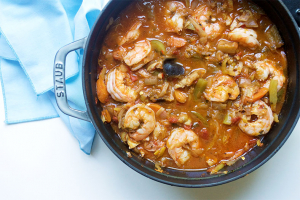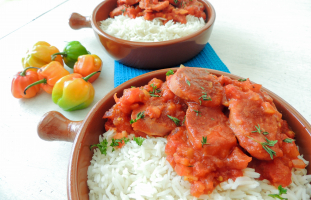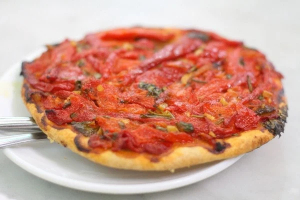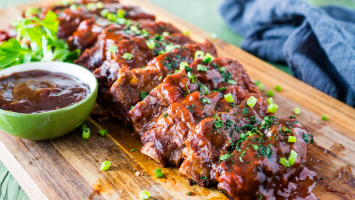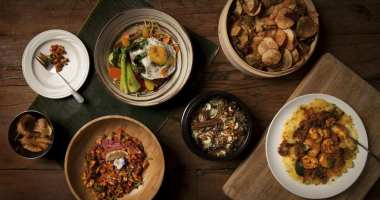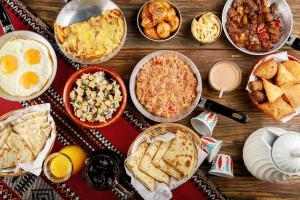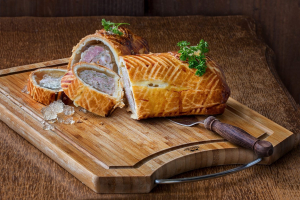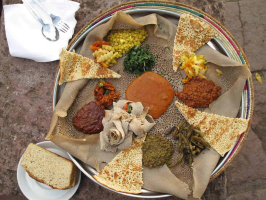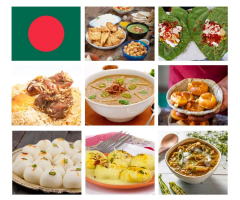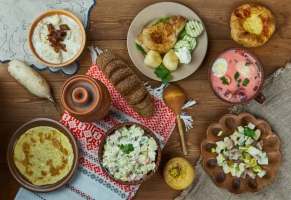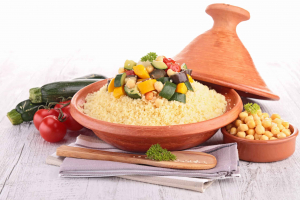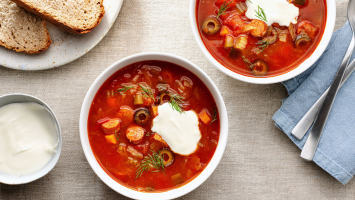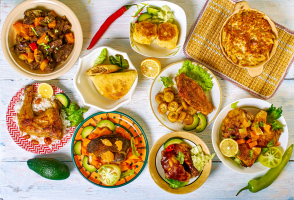Top 5 Best Foods In Moldova With Recipe
Moldova is a small country in Eastern Europe located between Romania and Ukraine. It is not on many people's trip itineraries. If you have the opportunity to ... read more...visit Moldova, you must sample Moldovan cuisine. Moldovans are warm and kind, and they usually show it by serving a lot of Moldovan food and alcohol! Romanian, Russian, Ukrainian, Polish, Greek, and other countries' cuisines have influenced Moldovan cuisine. Moldovan cuisine, like many Eastern European cuisines, is rich on meat, potatoes, and other vegetables. Moldovan cuisine has a reputation for being a little too bland for many Americans. In recent years, the country has experienced a stronger Western food influence, with more western eateries. While many people consider Moldovan food delicious, if you try it and it’s not for you — worry not, there are many western-influenced restaurants in Chisinau, the capital of Moldova. Here are top 5 best foods in Moldova
-
'mămăliga,' or polenta, is without a doubt Moldova's most well-known and traditional food. Polenta is created using corn flour and a small amount of butter. It's usually served with sour cream and sheep's cheese or cottage cheese. For gourmets, a classic pork stew that pairs nicely with this dish is available. They'd also make'mujdei de usturoi,' a garlic-based sauce with oil, water, and vinegar. They'd take a piece of'mămăligă,' dip it in the sauce, then top it with sheep cheese and sour cream. Most tourists find this sauce unappealing, but it is a favorite among Moldovans!
Ingredients
- ½ kg polenta (cornmeal), 250 g feta cheese, 250 g ricotta cheese, 1 tablespoon oil to brush, sour cream, 1 egg per person
Instructions
- Polenta:
- Prepare the polenta as indicated on the package.
- Once the polenta is boiled until a porridge, pour half of the polenta in an oven proofed dish that is brushed with oil.
- Sprinkle the mixture of crushed feta cheese and ricotta cheese.
- Pour over the rest of polenta and bake in middle of the oven at 200°C. for approximately 20 min.
- Take the dish out of the oven, let rest a few minutes.
- Poached eggs:
- Boil ½ liter water with 1 teaspoon salt. When the water boils, pull the pot away from the heat while breaking the eggs.
- Then cook for 1-2 minutes on medium heat. Take the eggs up with a sieve.

romanianfood.wordpress.com 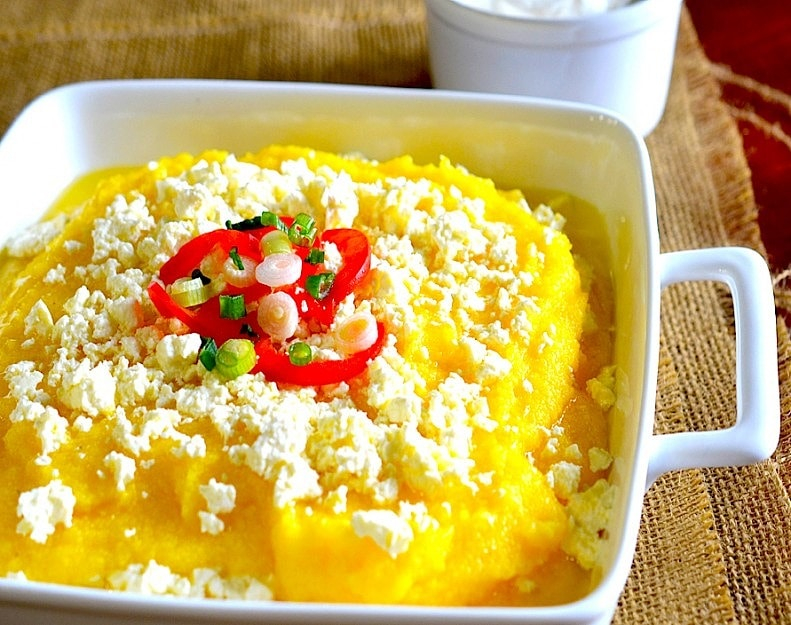
thefooddictator.com -
Moldovan pies stand in second position in terms of traditional Moldovan cuisine. Pies, unlike mămăliga, are still popular among teenagers. Moldovan pies are still prepared at home, but there are a plethora of pie shops and restaurants, as well as various delivery services. You should try a couple different types of pies. For a savory taste, try the cheese pies, cabbage pies, and potato pies. If you have a sweet tooth, try the cherry pies, apple pies, and pumpkin pies.
Ingredients
- 500 g/ 1.1 lbs/ 4 ¼ cups all-purpose flour, 1 sachet instant dry yeast, 1 teaspoon granulated sugar, 1 teaspoon fine sea salt, 250 ml/ 8.4 fl.oz/ 1 cup lukewarm water, 350 g/ 12.3 oz feta cheese preferably sheep's feta, 3 green onions, 1 small bunch dill, fine sea salt and pepper, a little oil for frying
Instructions
- Yeast dough:
- In a large bowl mix together the flour, yeast, sugar, and salt.
- Slowly start adding the lukewarm water, mixing with a spoon until the flour is incorporated. Knead the dough for about 10 minutes or until it stops sticking too much to the walls of the bowl, flouring your hands from time to time if necessary.
- Cover the bowl with a kitchen cloth and let rise in a warm place for about 1 hour or until doubled in size.
- Alternatively, you can prepare the yeast dough in a food processor using the appropriate kneading accessories.
- Filling:
- Crumble the feta cheese finely, but don't turn it to a paste, it is enough if you use a fork to crumble it.
- Chop the scallions and the dill very finely.
- Mix everything together and adjust the taste with salt and pepper.
- Shape the pies:
- Knead the risen dough very shortly to bring it in shape again. Divide it into 10 parts and form 10 balls. Roll each ball into a thin circle.
- Place some filling in the middle of the circle and form a pocket by bringing together all the sides of the circle and pressing lightly to seal the pocket.
- Roll the pocket again to make it flat. (See pictures above)
- Place the pies on a piece of baking paper and let rest for 10 minutes.
- Fry:
- Heat a large non-stick pan. Brush it or spray it with a little oil and fry the pies about 2-3 minutes on each side.
- You will have to work in two or three batches. Keep the finished pies warm in the lightly heated oven. Serve immediately.
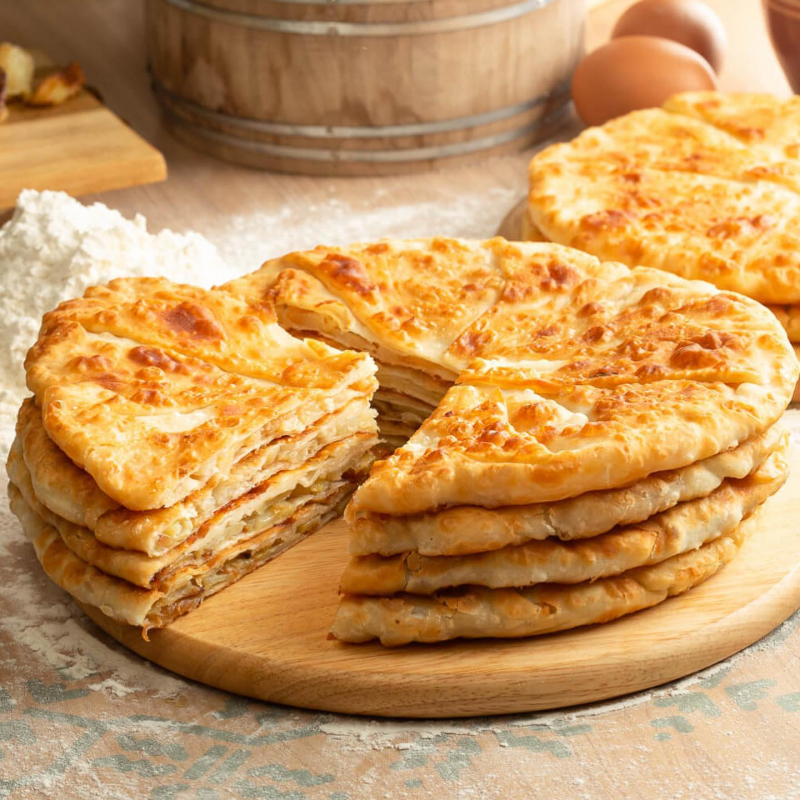
Facebook.com 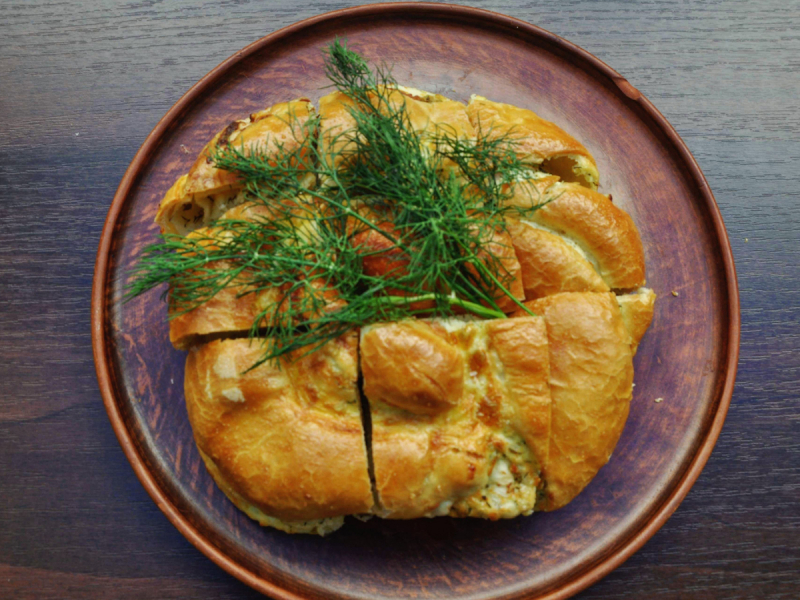
Facebook.com -
'Sarmale,' or stuffed cabbage rolls, is a delicacy that appears frequently in the cuisines of several Eastern European countries. They're known as'sarmi' in Bulgarian cuisine. 'Holubtsi' is a Ukrainian dish. 'Golabki' is a Polish dish. Macedonian cuisine, Serbian cuisine, Croatian cuisine, Lithuanian cuisine, Russian cuisine, Romanian cuisine, and other cuisines use them. These Moldovan filled cabbage rolls are a must-have for any holiday or party in Moldova. These are cabbage rolls that have been loaded with rice and minced pork or chicken, as well as chopped onion and carrots, then cooked slowly. Unlike in some other cuisines, they are served with large dollops of sour cream in Moldovan cuisine!
Ingredients
- FOR THE SAUCE: 2 tbsp. extra-virgin olive oil, 1/2 large onion, chopped, 3 cloves garlic, minced, 2 tbsp. tomato paste, 1 (28-oz.) can crushed tomatoes, 2 tbsp. balsamic vinegar, 1 tbsp. brown sugar, 2 tsp. dried oregano, Kosher sal, Freshly ground black pepper
- FOR THE CABBAGE ROLLS: 15 cabbage leaves, 1 lb. ground beef, 1/4 c. uncooked white rice, 1/4 c. Italian bread crumbs, 1/2 large onion, chopped, 2 tbsp. freshly chopped parsley, plus more for garnish, Kosher salt, Freshly ground black pepper
Instructions
- FOR THE SAUCE
- Preheat oven to 350°. In a large deep skillet (or large pot) over medium heat, heat oil. Add onion and cook until soft, 5 minutes. Stir in tomato paste and garlic and cook until fragrant, 1 minute. Pour over tomatoes then add vinegar, sugar, and oregano.
- Lower heat to medium-low and simmer for 20 minutes. Season with salt and pepper.
- FOR THE ROLLS
- In a large pot of boiling water, blanch cabbage leaves until tender and flexible, about 1 minute.
- Make filling: In a large bowl, combine ground meats, 1 cup sauce, rice, bread crumbs, onion, and parsley. Season with salt and pepper.
- Spread a thin layer of sauce on the bottom of a large baking dish.
- Using a paring knife, cut out the hard triangular rib from each cabbage leaf. Place about ⅓ cup filling into one end of each leaf, then roll up, tucking in the sides as you roll. Place rolls seam side-down on top of sauce in baking dish.
- Spoon remaining sauce on top of cabbage rolls then cover dish with foil. Bake 1 hour 15 minutes, until rice and meat are cooked through.
- Garnish with more parsley before serving.
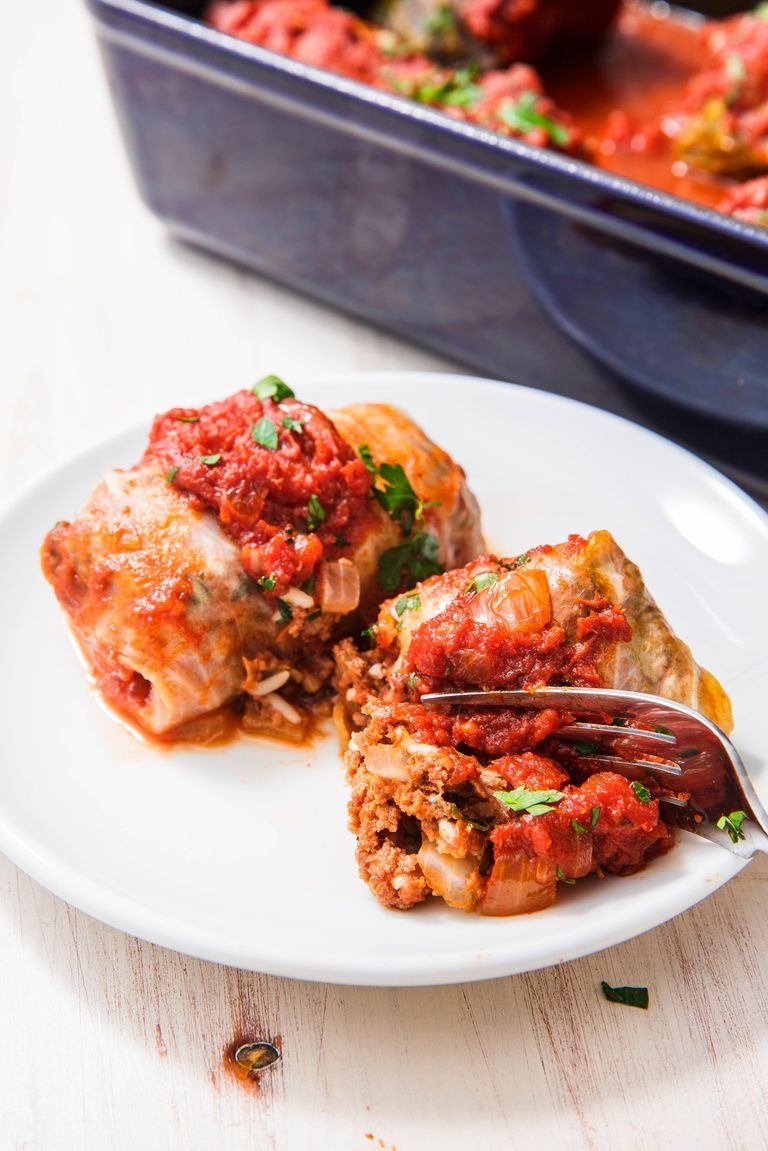
delish.com 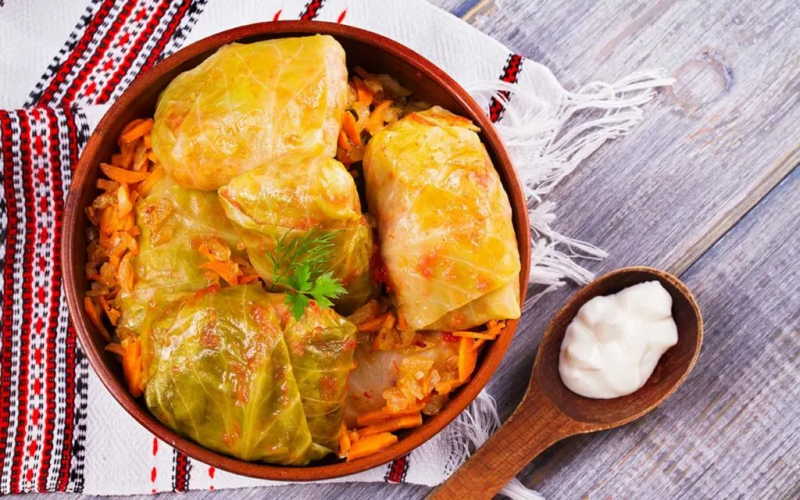
delish.com -
A traditional Moldovan soup called zeama. It's comparable to chicken noodle soup, but with a slightly sour flavor. Chicken, chopped vegetables (such as onions, carrots, bell peppers, and potatoes), and handmade noodles are the main ingredients in this soup. The sour overtones are created by adding 'borș acru de casa' (a liquid component made from fermented wheat or barley bran that most people buy rather than manufacture at home) or lemon juice. Depending on your preferences, Zeama is generally served with sour cream, toast, and fiery chili peppers.
Ingredients
- 1 small chicken cut up, 12 cups water, 1 onion diced, 1 carrot cut into bite size pieces, 1 large tomato diced, 2 cups egg noodles, 3 Tablespoons of lemon juice, 1/2 cup parsley fresh chopped, 1/2 cup dill weed chopped, 3 Tablespoons fresh squeezed lemon juice., Salt and pepper to taste, thyme sprigs 1 per serving to garnish, lemon wedge to garnish
Instructions
- In a large pot put in the chicken pieces and 12 cups of water
- Bring to a boil gently and start removing the froth as it rises to the top, just skim it off with a spoon.
- Add the chopped onion, tomato, carrot and lovage or celery leaf along with some salt and pepper
- Cook until chicken is cooked through and then add the egg noodles and lemon juice.
- After about 5 minutes add the parsley and dill weed. Cover the pan and remove from heat and let sit covered to let the flavors mix together.
- Ladle into bowls and garnish with fresh thyme sprig and lemon slice
- Serve warm with cornbread.

dreamstime.com 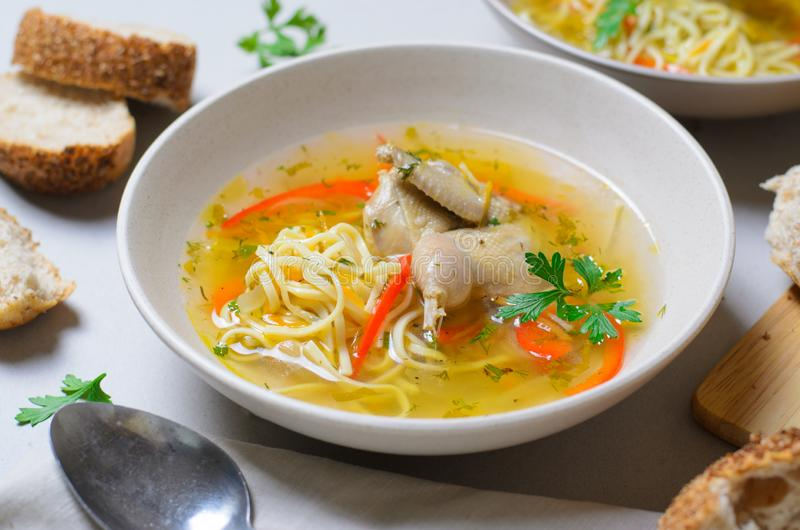
dreamstime.com -
Borscht is most closely identified with Ukrainian cuisine outside of Eastern Europe. However, it is quite popular in most of Eastern Europe and a few other countries, such as Belarus, Estonia, Latvia, Lithuania, Poland, Russia, Romania, and, of course, Moldova. After 'zeama,' borscht is a popular soup in Moldova. While 'zeama' (described above) has a sour flavor and a light tint, borscht has a sweeter flavor and a deep, rich crimson color. Beetroot is the key component, and that's what gives it that distinctive deep red color. Moldovans add a variety of veggies to their beetroot soup. Carrots, onions, potatoes, cabbage, and tomatoes are among them. Borscht can also have meat in it. However, the veggie recipe has long been a favorite in American households.
Ingredients
- 500 grams wheat bran. 100 grams wheat bread or black bread, 3 tbsp cornmeal, 2 green lovage stems, 6–8 cherry leaves, 5 liters hot water (hot, but not boiling)
Instructions
- In a large pot, add around 250 grams of wheat bran and the bread, crumbled into small pieces. Mix in a small quantity of cold water, just enough to wet the composition and get a thick and smooth consistency.
- Cover the pot with a lid and let it sit at room temperature for around two days. It should be enough time for it to ferment. The result you’ll obtain after the two days—the fermented wheat bran—is called huste, or husti. This is the first part of the preparation of the final sour borș.
- Add the huste, the rest of the wheat bran, the cornmeal, lovage stems, and cherry leaves to a larger pot. Mix them well. Pour 4-5 liters of hot water over them, mix the composition again, and let it sit at room temperature for another day. Mix it again for at least two to three times that day.
- Start to periodically taste the liquid until you can taste the desired sour flavor. It can take from 15 to 24 hours.
- Sift the liquid through a dense cotton cloth and then pour it into glasses or jars. Close the receptacles and put them in the fridge. It can be kept this way for up to one to two weeks, until it starts changing color.
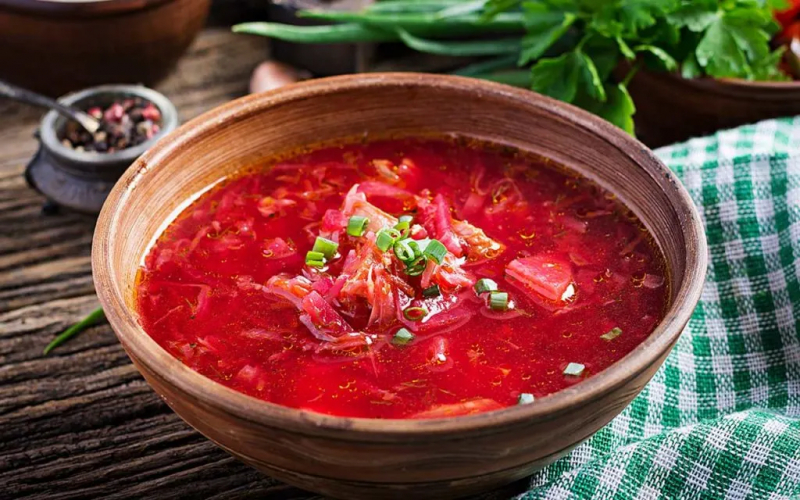
nomadparadise.com 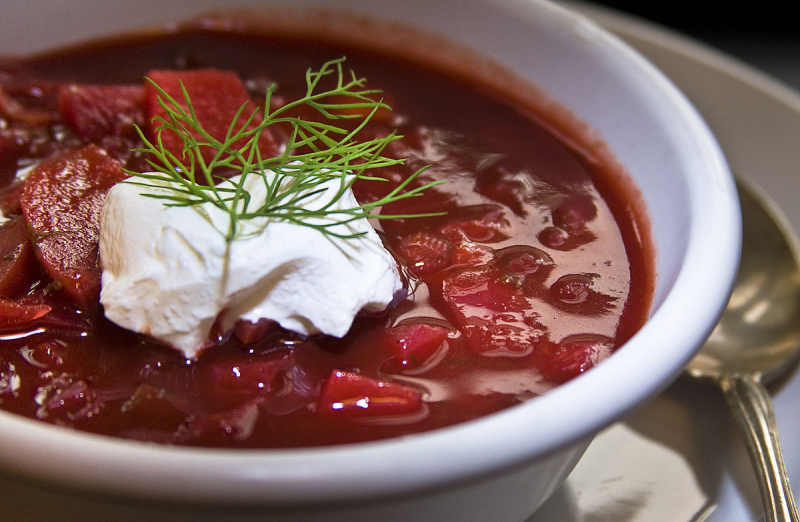
nomadparadise.com








